Polynesian Cultural Center’s First Full-Time Employee Retires at 92
Contributed By Mike Foley, Church News contributor

T. David Hannemann and his wife, Carolyn (center) are surrounded by six of their children who attended his PCC “graduation” event: (from left) Max, Maelita, Vi, Arthur, Howard, and (inset) Levao.
Article Highlights
- Tausilinu’u David Hannemann (“Uncle David”) was the PCC’s first full-time employee.
- Loved ones honored David with gifts, praises, and a feast after his lifetime of Church service.
- David made an impact on the lives of many by seeking wisdom through prayer.
“The secret of his success is that he sought wisdom on his knees.” —son Howard Hannemann
Related Links
LAIE, HAWAII
The Polynesian Cultural Center’s first full-time employee and most-senior living associate retired—again—during a special “graduation” ceremony on December 28, 2017. Four generations of his family, friends, and colleagues marked the occasion with Polynesian chanting, gift-giving, memories, praises, and, of course, a feast.
David’s beginnings at the PCC
The First Presidency approved hiring Tausilinu’u David Hannemann as the center’s first full-time paid employee while labor missionaries and community volunteers were still finishing the visitor attraction. Following official opening ceremonies on October 12, 1963, Hannemann served as operations manager, implementing PCC programs and activities that are still popular almost 55 years and 40 million visitors later, including the popular canoe tour, canoe pageant, and luau dinner.
“David is the first and the longest-living ‘treasure’ we have here at the Polynesian Cultural Center,” said Alfred Grace, PCC president and chief executive officer. “We refer to our graduates as ‘living treasures,’ because they are foundational to the Center, and their mana [spiritual essence] will remain here forever. This includes our labor missionaries [several of whom were at the event], who built the Polynesian Cultural Center.”
“We’re so grateful to have this opportunity to acknowledge not only Tausilinu’u David Hannemann, but also his eternal companion, Carolyn,” Brother Grace said. “I am so grateful to David Hannemann for all that he has done. We love them both dearly here at the Polynesian Cultural Center.”
David’s story
Hannemann, now 92, is a Samoan with German heritage, who left his native islands in the late 1940s and spent time in Hawaii and Utah before being called to the Hawaii Mission from 1949 to 1951. He learned to speak fluent Hawaiian starting in his first area, the Hansen’s Disease colony at Kalaupapa, Molokai.
Following his mission, Hannemann settled in Los Angeles, California, married Carolyn Harline in the Los Angeles California Temple in 1955, and began to raise a family that eventually totaled nine boys and two girls. He also started a popular Polynesian luau catering business.
Having set the PCC on a course to eventual success in those early years, Hannemann returned to California in 1969 to rekindle his business there and also work in tourism management, but then-PCC president William H. Cravens recruited him to return as a senior vice president in 1983.
For the next 22 years, Hannemann applied his creativity and distinctive management style to many Polynesian Cultural Center departments. For example, he started the successful Laie tour, which has spurred several million people to include the Laie Hawaii Temple Visitors’ Center in their PCC experience. He also helped completely overhaul the center’s food and beverage operations and turned the PCC’s original Hale Aloha theater into the primary venue for its award-winning Alii Luau.
Hannemann retired from the center for the first time in 1995, when he and Carolyn were called to serve as president and matron of the Laie Hawaii Temple. During his years in Laie he also served in many Church callings, including bishop, high councilor, and stake president, and most recently as the Laie Hawaii Stake patriarch. He also continues to serve as a sealer in the Laie Hawaii Temple.
Completing their temple presidency calling in 1998, Hannemann has volunteered ever since to help compile the history of the Polynesian Cultural Center. He also continued during this time to share his Aloha spirit with countless guests and mentor new generations of young PCC employees, who affectionately call him “Uncle David,” in the island way.
Honoring Uncle David
During the “graduation” event, some of these recalled Uncle David’s contributions, wit, and practical jokes over the years. A number drew laughter as they told how he could turn driving his electric utility vehicle through the PCC villages into a thrill ride.
Several related how former PCC president Lester W. B. Moore recognized Uncle David’s great faith, putting him in charge of the weather. “Every single important function where we have needed to have good weather, we put Uncle David in charge, and we had exactly the kind of weather we needed,” said Delsa Atoa Moe, vice president of cultural presentations. She also praised him as an “immaculate dresser” who often wore white pants and shoes and a large mother-of-pearl shell pendant.
She and others recounted his unique training methods, which could include climbing step-ladders and standing on tables to emphasize points. He also often used posters that Carolyn, who had graduated in art education from Pepperdine University, hand-lettered for him. As he has for many years, he typically saved all these materials.
PCC village representatives also showed their deep respect for Uncle David’s Polynesian roots. For example, speaking in Samoan, islands director Steve Laulu said, “There are no words to express thanks equivalent to your efforts at the PCC. We will not only remember them, but we will also try to work hard to make the PCC even better and more beautiful for those who come here.”
Gifts of thanks
On behalf of the Hawaiian village, Naauao Pane’e first addressed Uncle David in Hawaiian and then presented him with a carved hoe koa—a solid koa-wood paddle, a traditional symbol for working hard, “because it is the hoe that makes a canoe go, and it is the hoe uli of a voyaging canoe that steers it to its destination.”
“This is a small gift but a great one in all our hearts and love for you on this special day,” Pane’e added.
Tongan village manager Alamoti Taumoepeau presented Carolyn with a large piece of tapa or bark cloth made at the PCC and Uncle David with a hand-carved wooden kali, a traditional neck-rest “pillow.”
“In Tongan culture this is symbolic of the kali loa—the long arm of a parent,” Taumoepeau explained. “There’s a Tongan expression that whenever anyone succeeds, graduates, or excels in any event or activity, we always say it is no surprise or wonder, because he or she rested on the kali loa or the arm of the parent.”
“This is symbolic of Tonga’s greatest learning institution, because all learning happens in the arms of the parents,” Taumoepeau continued. “Today, I not only pay tribute to you and the wonderful legacy you have left us, but also to thank your parents and your forefathers for giving us one of PCC’s greatest sons, and for his loving us with the many experiences and stories we will always treasure.”
“After all the gifts and wonderful thoughts, it doesn’t seem like enough to honor Uncle David,” said Eric Workman, PCC chief marketing officer and vice president, who emceed the event. “Our purpose for meeting today was not only to remind him that we remember all that he has contributed to the center, but we wanted Carolyn to know how much we have appreciated your family and your service through David.
“We wanted the children and grandchildren to know that we remember. We wanted you to have a glimpse of what your father has done and all that we are indebted to him for, including the literally millions of people that his work has touched. Our Heavenly Father is well aware of his sacrifices and work.”
David’s secret to success
Following the presentations, Hannemann’s son Howard said of his father on behalf of the family, “The secret of his success is that he sought wisdom on his knees. I can’t tell you how many early mornings we’d get up and we’d see him on his knees. All of us, as we’ve grown up, have said we want to be like dad.”
And in conclusion, David Hannemann responded, “My heart is overflowing with gratitude for each and every one of you. I love you. I will try to be worthy of all the love and kind things you’ve said about me.
“I promise you that each and every one of you here has been blessed,” he said. He also predicted that some of his grandchildren would be at the centennial celebration for the Polynesian Cultural Center in 2066.

PCC president and CEO Alfred Grace (left) recalled how Uncle David (right), who was president of the BYU–Hawaii 2nd Stake in the early 1990s, called him as a young bishop for a married student ward. “I’m very grateful to Tausilinu’u David Hannemann for being such a grand man, for being such a great example in many ways, but most importantly, for being such a wonderful example of how a man should treat his family and for raising a family as best he could,” he said. Photo by Mike Foley.
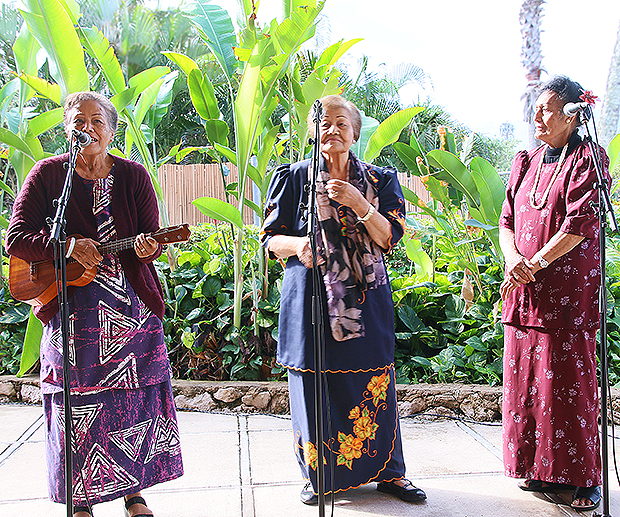
Luse Tapusoa Magalei (left), T. David Hannemann’s first administrative assistant at the Polynesian Cultural Center in the 1960s, sang two of Uncle David’s favorite songs with her sisters Oliana Tautū (center) and Olive Itula at his “graduation” event on December 28, 2017. Photo by Mike Foley.
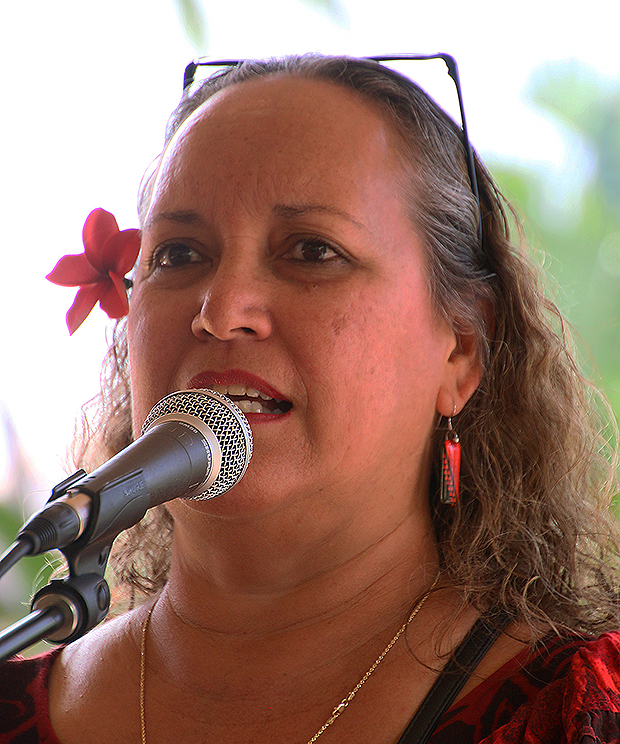
Delsa Atoa Moe, PCC vice president of cultural presentations, described “Uncle David” as a “passionate host” with “great attention to details so every PCC guest would feel like a VIP.” Photo by Mike Foley.
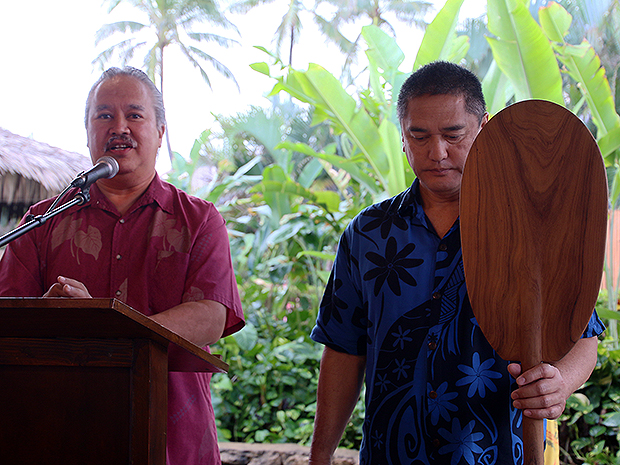
Naauao Pane’e (left) and Kaipo Manoa, assistant manager and manager, respectively, of the PCC’s Hawaiian village, presented T. David Hannemann with a traditional hoe or paddle carved from a single piece of prized koa wood. The paddle and the kukui (candlenut) oil Manoa wiped it with are symbolic of leadership and sharing knowledge through hard work. Photo by Mike Foley.

Tipa Galea’i, PCC Samoan village manager, presented T. David Hannemann with the traditional to’oto’o (chiefly orator’s staff) and fue (whisk), both made from the stump of a coconut tree recently removed from the village, along with a red ulafala or pandanus-seed lei—all symbolic of a chief’s authority. He also compared Uncle David to a poutū, “a pillar that holds up a building. That’s who you are to us,” he said. Photo by Mike Foley.
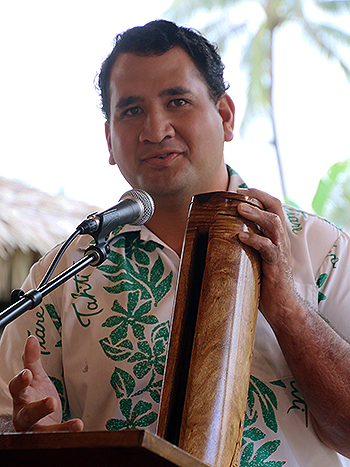
Rainui Arapari, assistant manager of the Polynesian Cultural Center’s Tahitian village, presented T. David Hannemann with a wooden to’ere drum, whose sounds he said represented “a sign of greatness.” Photo by Mike Foley.
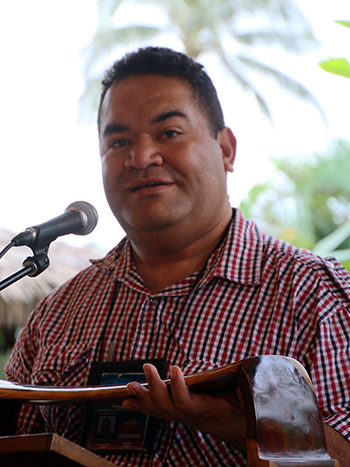
PCC Tongan village manager Alamoti Taumoepeau presents T. David Hannemann with a hand-carved kali, a traditional wooden neck rest or “pillow” that symbolizes “the wonderful legacy you have left us.” Photo by Mike Foley.
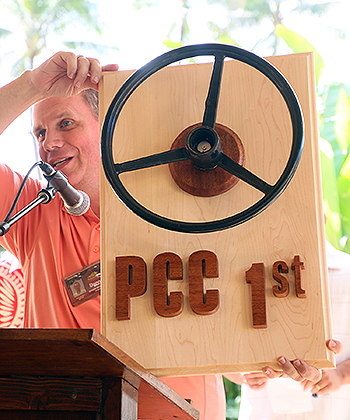
Daniel Briskin, PCC director of facilities management, helped create a steering wheel plaque to commemorate David Hannemann’s inclination to use his electric utilities vehicle as a “thrill ride” years ago. Photo by Mike Foley.
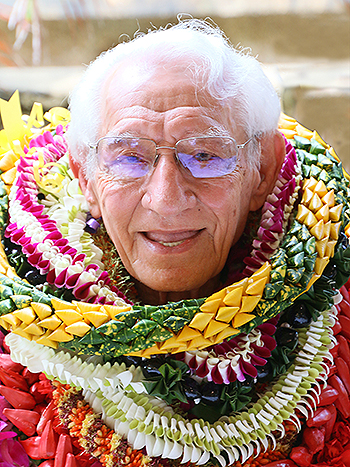
Tausilinu’u David Hannemann, now 92, became the first paid full-time employee before the Polynesian Cultural Center opened in 1963. He retired—for the second time—on December 28, 2017.
